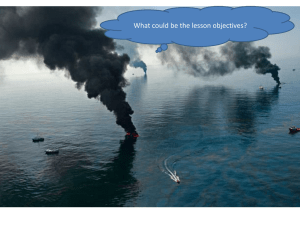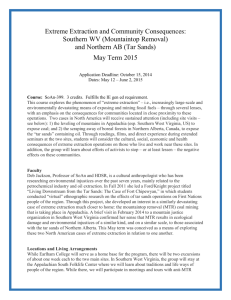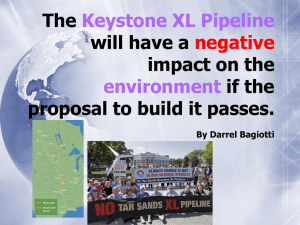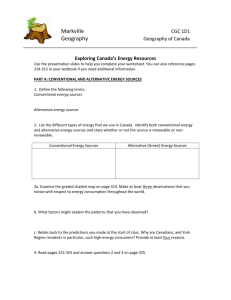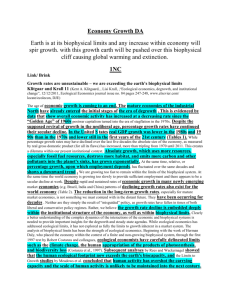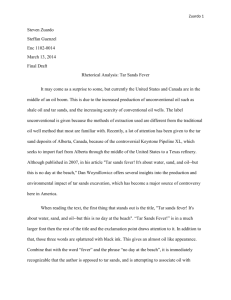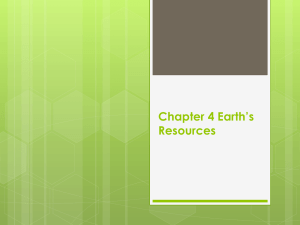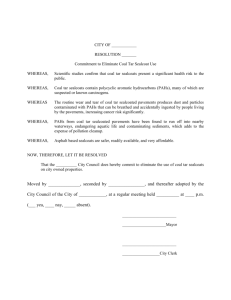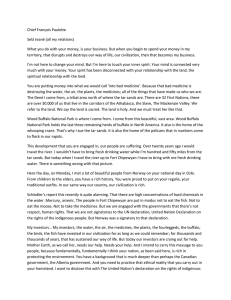A RESOLUTION EXPRESSING OPPOSITION TO THE
advertisement
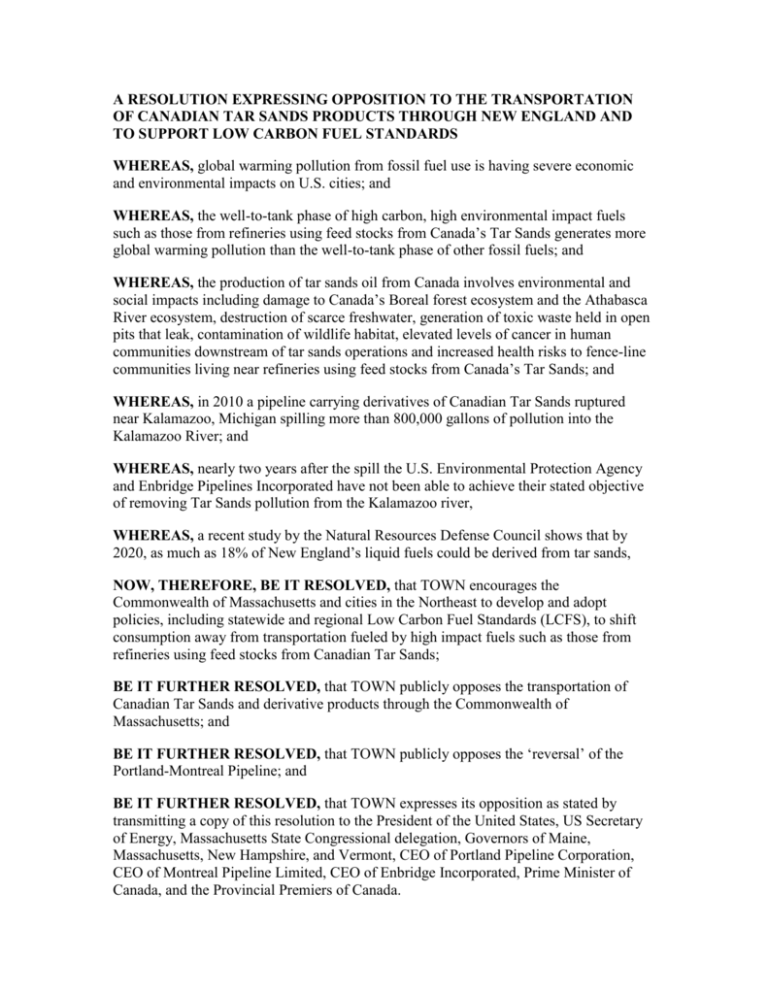
A RESOLUTION EXPRESSING OPPOSITION TO THE TRANSPORTATION OF CANADIAN TAR SANDS PRODUCTS THROUGH NEW ENGLAND AND TO SUPPORT LOW CARBON FUEL STANDARDS WHEREAS, global warming pollution from fossil fuel use is having severe economic and environmental impacts on U.S. cities; and WHEREAS, the well-to-tank phase of high carbon, high environmental impact fuels such as those from refineries using feed stocks from Canada’s Tar Sands generates more global warming pollution than the well-to-tank phase of other fossil fuels; and WHEREAS, the production of tar sands oil from Canada involves environmental and social impacts including damage to Canada’s Boreal forest ecosystem and the Athabasca River ecosystem, destruction of scarce freshwater, generation of toxic waste held in open pits that leak, contamination of wildlife habitat, elevated levels of cancer in human communities downstream of tar sands operations and increased health risks to fence-line communities living near refineries using feed stocks from Canada’s Tar Sands; and WHEREAS, in 2010 a pipeline carrying derivatives of Canadian Tar Sands ruptured near Kalamazoo, Michigan spilling more than 800,000 gallons of pollution into the Kalamazoo River; and WHEREAS, nearly two years after the spill the U.S. Environmental Protection Agency and Enbridge Pipelines Incorporated have not been able to achieve their stated objective of removing Tar Sands pollution from the Kalamazoo river, WHEREAS, a recent study by the Natural Resources Defense Council shows that by 2020, as much as 18% of New England’s liquid fuels could be derived from tar sands, NOW, THEREFORE, BE IT RESOLVED, that TOWN encourages the Commonwealth of Massachusetts and cities in the Northeast to develop and adopt policies, including statewide and regional Low Carbon Fuel Standards (LCFS), to shift consumption away from transportation fueled by high impact fuels such as those from refineries using feed stocks from Canadian Tar Sands; BE IT FURTHER RESOLVED, that TOWN publicly opposes the transportation of Canadian Tar Sands and derivative products through the Commonwealth of Massachusetts; and BE IT FURTHER RESOLVED, that TOWN publicly opposes the ‘reversal’ of the Portland-Montreal Pipeline; and BE IT FURTHER RESOLVED, that TOWN expresses its opposition as stated by transmitting a copy of this resolution to the President of the United States, US Secretary of Energy, Massachusetts State Congressional delegation, Governors of Maine, Massachusetts, New Hampshire, and Vermont, CEO of Portland Pipeline Corporation, CEO of Montreal Pipeline Limited, CEO of Enbridge Incorporated, Prime Minister of Canada, and the Provincial Premiers of Canada. Or act on anything relative thereto. PETITIONER’S ARTICLE DESCRIPTION The extraction and processing of tar sands oil requires a vast and destructive industrial operation. It razes and fragments large swaths of the Boreal forest, and burns enough energy to make tar sands oil production the fastest growing contributor to Canada’s greenhouse gas emissions. It also harms the public health of communities located near oil refineries, including First Nations1. Tar sands oil is not just harmful to local communities involved in extraction and processing: tar sands oil is known as “the world’s dirtiest oil” because the climate emissions are significantly higher than for conventional crude oil.2 In a comparison of production emissions only, the per-barrel greenhouse gas emissions associated with oilsands extraction and upgrading are estimated to be 220 to 350 per cent higher than conventional crude oil produced in Canada or the United States.3 It is estimated that Canada’s climate emissions due to fuel will double from 2000 levels by 2020, because of tar sands oil.4 Tar sands oil also poses a direct threat to New England. Right now, tar sands oil accounts for less than 1% of New England’s fuel supply, but that is changing quickly as oil companies find new ways to bring tar sands oil into our region. By 2020, as much as 18% of New England’s liquid fuel supply could come from the tar sands.5 The pipeline companies Exxon and Enbridge are considering a pipeline plan that would take tar sands oil through New England6. The plan would reverse the direction of an aging pipeline in order to bring Canadian tar sands oil from Montreal, Canada to Portland, Maine. 1 Environmental Defense, Dirty Oil, Dirty Air: Ottawa's Broken Pollution Promise (2010). Pembina’s life cycle assessment checklist (Dan Woynillowicz, Jeremy Moorhouse and Danielle Droitsch, Life cycle assessments of oilsands greenhouse gas emissions (Pembina Institute, 2011). 3 Adam Brandt, Upstream greenhouse gas (GHG) emissions from Canadian oilsands as a feedstock for European refineries, Executive summary. (Department of Energy Resources, Stanford University, 2011), 41–42 4 Environment Canada National Inventory (1990‐2008), Environment Canada GHG Forecast 2011 5 Natural Resources Defense Council, What’s in Your Tank? Northeast and Mid-Atlantic States Need to Reject Tar Sands and Support Clean Fuels (January 2014), http://www.nrdc.org/energy/files/tar-sandsnortheast-midatlantic-IB.pdf. 6 Natural Resources Defense Council, Going in Reverse: The Tar Sands Oil Threat to Central Canada and New England (2012) 2 The pipeline project would transport tar sands oil through some of the most important natural and cultural places in Ontario, Quebec, Vermont, New Hampshire, and Maine. Areas the pipeline puts at risk include the Saint Lawrence River, the most important river in eastern Canada and a seasonal home for blue whales; the Androscoggin River, a New England waterway popular with anglers and paddlers as well as bald eagles, black bears, and moose; and Sebago Lake, home to native landlocked Atlantic salmon and a major drinking water resource for Portland, Maine’s largest city7. As Nobel Laureate Jody Williams said in a recent Boston Globe op-ed “Tar sands oil is dirty, and they don’t want it their backyard. And I don’t want it in mine.”8 An oil spill in these areas could devastate wildlife, pollute water, and compromise the health of local residents. Pipeline spills can and do occur, and there are indications that tar sands oil spills are far more prevalent than conventional oil spills. A tar sands spill near rivers, lakes, and other water bodies causes much more harm than a conventional oil spill because tar sands oil can sink and seriously complicate cleanup efforts9. Transporting tar sands on this new route would only bring risks to Eastern Canada and New England. The 60+ year-old pipeline runs over many waterways, including the Connecticut River - which flows in Vermont, New Hampshire, Massachusetts, Connecticut. More than 400 miles long, the Connecticut River is the mightiest river in New England and an American Heritage River. The river drains about one third of New England’s landscape and provides 70 percent of all freshwater inflows to Long Island 7 Natural Resources Defense Council, Going in Reverse: The Tar Sands Oil Threat to Central Canada and New England (2012) 10‐11 8 The Podium “Keep dirty oil out of New England” By Jody Williams, January 29, 2013 9 Natural Resources Defense Council, Pipeline Safety Trust, National Wildlife Federation, Sierra Club, Tar Sands Pipeline Safety Risks (2011) Sound.10The pipeline crosses the Connecticut River at Guildhall, Vermont, just north of the popular Moore Reservoir. Passing this resolution through TOWN Town Meeting will send a powerful signal to the companies that want to bring this “dirtiest oil” to New England. It will also send a signal to the statehouse, the governor’s office, and to our representatives in DC that on the local level, people want to stand up against climate change and for cleaner energy. TOWN has made a major commitment to tackling climate change already, like EXAMPLES. This is simply another step towards making our voice heard and being a leader on this important issue. This resolution states that because of climate change concerns from tar sands as well as spill risks and production issues like boreal forest destruction, TOWN will endeavor to move away from fossil fuels in general and tar sands oil in particular and move towards more sustainable and less polluting fuels like renewable energy. It also states that TOWN encourages the state of Massachusetts and other cities and states in the Northeast to do the same. And lastly, it resolves that TOWN will transmit a copy of this resolution to various elected and appointed representatives, including the President of the United States, the Massachusetts State Congressional delegation, the Governor of Massachusetts, the CEOs of involved pipeline companies, the Prime Minister of Canada, and the Provincial Premiers of Canada. Those parties represent the other states, elected and appointed individuals, and companies who have a stake in this issue. 10 12 P eter Alden and Brian Cassie, National Audubon Society Field Guide to New England (New York: Alfred A. Knopf, 1998), p. 13. Connecticut River Watershed Council, “The Connecticut and its tributaries,” http://www.ctriver.org/our_region_and_rivers/about_our_rivers/index.html (accessed April 12, 2012). Connecticut River Watershed Council, “Watershed Facts,” http://www.ctriver.org/our_region_and_rivers/ river_facts/index.html (accessed April 12, 2012).
